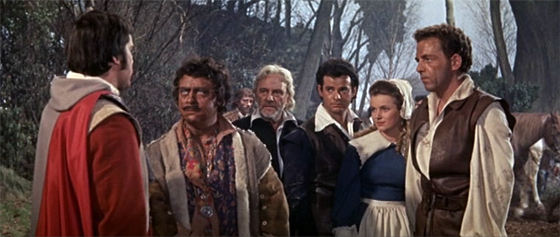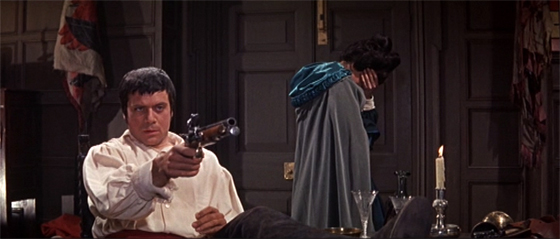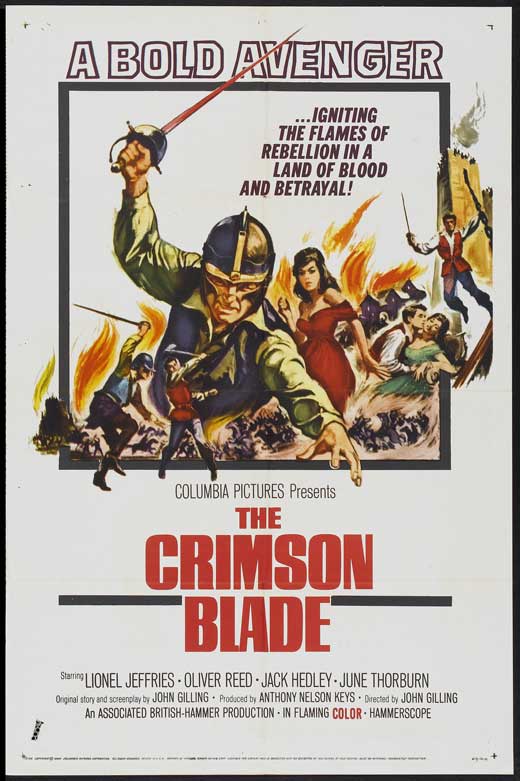
The film is called The Scarlet Blade (aka The Crimson Blade, 1963), but don’t be fooled. The hero doesn’t wear red, and he doesn’t show up in a mask slicing his insignia on the faces of his enemies. This mid-60’s Hammer swashbuckler doesn’t buckle many swashes, and it’s not terribly concerned with heroics in general. Ostensibly the star is Jack Hedley (Witchcraft) as Edward Beverley, the son of a noted colonel executed for defying Oliver Cromwell. He’s the Scarlet Blade, but he’s not top-billed. Those honors go to Lionel Jeffries (First Men in the Moon, Chitty Chitty Bang Bang) and rising Hammer star Oliver Reed (The Curse of the Werewolf, The Damned), playing officers of Cromwell hunting the Beverley clan and their fellow Royalists. Far from Errol Flynn adventure, The Scarlet Blade is distracted by the dilemmas faced by its supporting players – those who surround Edward Beverley – turning this B-picture into a strangely uneasy film about the price of rebellion. Reed’s Captain Tom Sylvester is one of the more interesting portrayals of his Hammer years. At first he appears to be another of the actor’s ruthless sadists, but gradually he develops more depth. Sylvester hates the Beverleys, but is politically apathetic. He offers to change coats to please the woman he loves, Claire (June Thorburn, The 3 Worlds of Gulliver), the daughter of the fierce Colonel Judd (Jeffries). At first, we can’t tell if it’s merely a ploy, and neither can Claire or her Royalist friends. But she gives him a chance to prove his loyalty: he delivers information which allows the Scarlet Blade to lay an ambush against the Roundheads. In exchange, the self-obsessed captain expects Claire to immediately surrender her charms to his greedy lips; instead, she accepts the embrace of Edward Beverley. Sylvester is enraged, then resigned. He betrays the Scarlet Blade to Colonel Judd’s forces, but does so almost reluctantly. You almost feel for the guy, right up to the moment of his death. (And don’t think Reed goes down easy. He doesn’t so much chew the scenery as smash it to pieces.)

Oliver Reed, as Captain Sylvester, learns that the woman he loves (June Thorburn) has fallen in love with the Scarlet Blade.
The Scarlet Blade is written and directed by John Gilling, who also helmed Hammer programmers like The Shadow of the Cat (1961), The Pirates of Blood River (1962), The Reptile (1966), and – most notably – the atmospheric and influential The Plague of the Zombies (1966). The action scenes are somewhat lethargic, even in the “spectacular” finale, with horses riding past explosions and swords clashing; and Hedley makes little impression as the story’s hero. In fact, he’s largely absent from the narrative. Gilling is far more interested in the Judd household than the Beverleys, focusing on Captain Sylvester’s lust for Claire, and the colonel’s disappointment in his daughter’s political awakening: there’s a nice scene when Judd offers a toast in honor of Cromwell, and Claire refuses to drink…until everyone departs the table, she whispers “The Scarlet Blade,” and takes a sip. The final scene is strangely touching, as Judd belatedly makes peace with his daughter’s decision. Still, this would be an entirely forgettable matinee movie if it weren’t for Reed’s performance; Sylvester fits neatly into the actor’s resumé of debauched but troubled souls – there’s a line to be traced from Captain Sylvester to Father Grandier in The Devils (1971). Perhaps he’s too good here, since it’s difficult to determine why he obsesses so much over Claire (Thorburn is slightly miscast). But when he’s onscreen, The Scarlet Blade becomes far more fascinating than it ought to be.










